- Home
- Lou Cameron
Stringer in Tombstone Page 4
Stringer in Tombstone Read online
Page 4
She climaxed ahead of him. He was so tired he’d have had some trouble getting there at all if she hadn’t been so great in bed. When he came at last and lay panting atop her soft and surprisingly pneumatic body, she murmured, “Well, I was looking for thrills and adventure when I left that drab old library back in Los Angeles, but I hardly expected to wind up a whore!”
He kissed her, sleepy-eyed, and muttered, “Don’t talk dumb. You know you’re just sort of friendly, Tillie.”
She shook her head, insisting, “There’s no nicer way to put it. I just gave myself to a man in exchange for money. Money he’s been spending on me, at any rate. It’s the same thing, when you get right down to it.”
He was aware he might be getting too heavy for her now, so he rolled off and snuggled her against his side with a soothing pat on her bare shoulder. “It’s not the same,” he declared. “To your way of thinking, all the married women in this country must be whores, unless they have jobs of their own. It’s just natural for us men to pay as we wander through life with you sweet little things. Can we get some sleep, now?”
She must have been feeling refreshed. “What if I’d been the one who paid for breakfast, this room, and Lord only knows what else by the time we get to Tombstone?” she argued.
“I wouldn’t have let you. I’m not a pimp. You’re not a whore. We’re just sleepy pals, I hope,” he said through a yawn.
But he hoped in vain. She rolled atop him, kissing him fondly before she announced, “If you mean that, I guess I don’t feel so dirty after all.”
Then he asked what she called what she was doing as she began to wake him up some more indeed. He laughed, demanding she let him mount her again to finish right, but she wanted to be the one on top this time; so it was even easier for him as she bounced over him, insisting she didn’t know what could have gotten into her as she took as much of it into her as she could manage.
After they’d both climaxed again, she seemed more content just to snuggle against him, crooning, “I guess you’d like to know how I lost my virginity and became so wicked, right?”
Stringer merely yawned again and said, “Not really. Let’s save some secrets for that train ride tonight, honey.”
He never knew whether she answered or not. He didn’t realize he was asleep until the bedside telephone woke him up. As he lifted the receiver, he saw the drawn shades were painted orange by the setting sun outside. He growled, “Yeah?”
In response to this the disgustingly chipper gal downstairs said, “It’s almost sunset, Mr. Barca. You said to awaken you about this time, remember?”
Stringer thanked her and hung up. Patting the mattress beside him, he groaned, “Time to rise and shine, little darling.”
That’s when he noticed he was alone in bed. He rubbed a hand across his sleep-gummed eyes and rolled out to pad over to the bathroom door. He knocked on it and called out, less gruffly, “We’ve just time to grab a bite before we have to catch that local, Tillie.”
There was no answer, so he opened the door. She wasn’t in there either. He took a leak, splashed some tap water over himself, and moved back to the bed, muttering, “What the hell?” Suddenly he snapped wide awake and dove for his duds. But when he hauled out his billfold he saw she hadn’t rolled him after all. So he got out the makings, fixed himself a smoke, and lit it as he pondered the mysterious ways of womankind.
Unless she’d been lying, Tillie had neither the railroad ticket she’d lost nor the funds to purchase another with. So where in the hell could she be?
By the time he’d smoked his tobacco down Stringer felt tempted just to get dressed and be on his way. He’d told the fool gal the train they had to catch would be leaving any time now. If she’d wandered off on her own…she’d wind up stranded here if he was gone when she got back.
He punched a pillow back in shape, growling, “We’re going to miss that train, sure as hell.”
But as he lay back down, much less tired than before, he was surprised to discover he was yawning. “Oh, well,” he decided, “a good night’s sleep in such pleasant company can’t kill you and there’s always another train.”
But the next time he woke up, he was still alone in bed. He rolled over, went back to sleep, and the next thing he knew a damned old bird was chirping just outside the window and it was starting to get light again. He propped himself up on one elbow, regarded the empty side of the bed beside him with a bemused smile, and said, “All right, Tillie. I can go along with a lady having some second thoughts in the cold gray dawn as well as most men. But this is getting just silly. If you’re not hiding under the bed, you’d best come out from wherever you might be. For I mean to board the morning train to Fairbank, come hell, high water, or tears of recrimination!”
His train left a little before ten A.M. Stringer got on alone. Although he’d waited at the hotel and then scouted all about it for the mighty mysterious librarian, Tillie Gower seemed to be just plain gone.
He was still feeling guilty about going on alone as his coach rolled southeast. He knew he’d have felt just as dumb, or more so, waiting back in Tucson for a gal who’d obviously given him the slip. It was why she’d done it that worried him. He hated the thought of a pretty—if feebleminded—lady wandering about Arizona with just a straw boater to her name. Nothing at all sensible worked. He’d been stood up by gals, same as the next fellow, but he couldn’t recall one giving him the slip after things had gotten that friendly. It was true a false-hearted woman could act friendly as that when she was out to take advantage of some poor brute. But Tillie had come to his aid, free, and hadn’t even run off with his tobacco.
As some redwings perched on a trackside wire caught Stringer’s eye, he decided, “Western Union. She found herself in a sticky situation and decided to slip out and wire home for money. That’s the only thing that I can figure, even if it does seem sort of insulting.”
He began to roll himself a smoke, muttering in a wistful tone, “Ain’t that just like a woman? Once they’ve had their wicked way with us innocent young things they can’t wait to drop us and move on to some new conquest.”
He was only half-joking. He knew there were such adventurous shemales. They were said to suffer a disorder known to medical science as nymphomania. That was what the docs called it, all right. He was glad hemales couldn’t catch anything like that. The same docs called a man who ran about screwing one gal after another a healthy specimen. It didn’t seem half as disorderly when boys was just boys. Everybody knew girls weren’t supposed to be just girls.
Stringer put the peculiar librarian out of his mind for the moment to concentrate on the passing scenery. It was just as well he was approaching Tombstone in broad daylight. He’d been picturing this corner of Arizona Territory all wrong in the darkness, the night before last.
The rolling range outside was higher than the cactus country along the Gila and Salt rivers. There was still a tall green saguaro standing with its hands up, here and there, but he saw much more chaparral, a lot of it mesquite. They got more rain down this way, but the range was badly managed as well as overgrazed. Letting mesquite crowd out your short grass was the mark of a lazy cattle man. Cows could live in mesquite chaparral, if you didn’t mind hunting for ‘em aboard a giraffe at roundup time.
From time to time he spotted a lone longhorn, wild as a deer, crashing through the chaparral because it had been spooked by the train. In country like this the cowcatcher in front of the locomotive wheels wasn’t there for show.
Stringer was just getting good and bored of chaparral when the tracks reached the Rio San Pedro and swung south along its west bank. The boulders and sun-silvered driftwood baking on the sandbars of the broad braided stream told silent tales of horrendous flash floods in the past. But at the moment there was barely enough water to qualify the San Pedro as a creek. When the conductor passed through to announce the next stop, Stringer asked him if the river, yonder, had done any damage to railroad property in the recent flood. The conductor sho
ok his head.
“We laid the tracks above the high-water mark. And I can’t say as I recall any flooding, all that recent.”
Stringer insisted, “I heard Tombstone was just about wiped out by a gully washer, recent as hell. I reckon the valley it sits in has to drain somewhere else, eh?”
The conductor frowned thoughtfully before he replied, “Nope. Tombstone’s only ten or twelve miles from the San Pedro, in the same watershed. Someone must have been greening you, son. If anything, it’s been drier than usual this year, so far. Just don’t go camping on the bottom of no wash, in case your informant was a mite premature.”
Then he ambled on down the aisle, leaving Stringer no more enlightened than before. He knew the wire services relayed many a hoax. Their job was to pass on news tips and let any editor really interested follow up on the same. But if someone had been having fun with the newspaper game, the intended humor was just too obscure for Stringer to grasp.
He still got off when the train crossed the river on a timber trestle and stopped at Fairbank, a cluster of frame shacks and ‘dobes clustered around a water tower and apparently suffering from the delusion it was a town. There was no depot, you just dropped down to bare gravel. But after he’d done so, Stringer noticed an office shed at the base of the water tower and toted his bag over that way. When he knocked on the door there was no answer. Then an older, red-faced man in bib overalls and a railroader’s cap finished waving bye-bye to the departing train and limped over to ask Stringer what he wanted.
Stringer explained, “A young lady named Matilda Gower had some baggage she was hoping they’d drop off here with you. I don’t suppose you’d know if she ever picked it up?”
With a slow shake of his head the old-timer said, “Not hardly. I’d recall such a rare occurrence. Folk are supposed to carry their own stuff on and off, here. We don’t mind if freight sets alongside the tracks until somebody comes for it, but we don’t hold ourselves at all responsible.”
Stringer tried, “What if the train crew just left her stuff by the tracks, then? She had—let’s see—a hatbox and a carpetbag?”
The old-timer shook his head again, saying, “Nope. I’d have noticed a hatbox. If I hadn’t, the night man would have told me about it when I came on. You never seen such an old biddy hen for gossip. The S.P. rules say we’re supposed to pass on any unusual happenings we notice on our own shift. But, I ask you, do you think a couple of Mex kids screwing under the trestle constitutes vital interest to the running of a railroad?”
Stringer agreed that what folk did under a railroad trestle was no doubt their own business. “I was sent here by the San Francisco Sun to cover the famous flash flood they just had in Tombstone. You’d have noticed if there’s been one, right?”
The older man looked sincerely confused as he replied, “I sure would. Only it’s been so dry we’re more worried about brush fires than floods around here. Who told you there’s been a flood in these parts, son?”
Stringer sighed. “A joker with a mighty dumb sense of humor, I reckon. Is there a telegraph station here in Fairbank, pard?”
“I got my own set, inside,” the old-timer answered. “But that’s only for railroad business. I think they used to have a Western Union over to Tombstone. Can’t say if it’s still in business. Things have been slow in Tombstone since the mines closed down.”
Stringer swore softly under his breath. Then he said, “Oh, well, I may as well be able to say I saw the place, still standing, before I head home. How would I go about getting there from here, pard?”
The old-timer took out a red bandana to wipe his red face as he pondered. After a moment he said, “You could walk it in three or more hours, I reckon. But if I was you I’d hire me a livery mount and just ride over. Hiram Booth, down to the other end of town, has ponies for hire at two bits a day.”
Stringer allowed that sure beat walking, thanked the old-timer for the information, and headed for the far end of town, which in truth wasn’t all that far anyway.
It was going on high noon. Hiram Booth, who was even older than the geezer at the station, answered his screen door in his long Johns and with the observation that it was, dammit, siesta time. But he brightened when Stringer bet him a silver dollar that he couldn’t provide him with a decent mount and solid saddle for a day or so. The old man came out in his bare feet and underwear to cackle, “You lose, pilgrim. Follow me and I’ll show you stock that could clean up at the Kentucky Derby if I wasn’t so merciful.”
Stringer followed him back between the ‘dobe house and frame stable, where a dozen odd scrub ponies stood listlessly in the shade of some desert willow watered by the overflow of a long, leaky trough. Their owner asked whether Stringer was aiming to ride brushpopping or sedate. When Stringer said he just needed something to carry him to Tombstone and back, the old man shot him a keen look and said, “Well, it was you as offered to pay handsome. So I’ll put you aboard old Blue Ribbon, that chestnut with the white blaze, there. She’ll carry you just about anywhere you want to go and I’ll saddle her decent for you as well. I got a Vadalia center-fire in the tack room with the stirrups already let out long. Come one, let’s get the gear.”
Stringer followed Booth into the tack room at one end of the stable. The old man took down a harness and throw-rope from one wall. He handed the rope to Stringer, saying, “I’ll tote bridle and saddle out. You rope old Blue Ribbon. I ain’t about to step in no corral in my bare feet.”
Stringer chuckled, preceded the old man back out to the corral, and shook out a loop before opening the gate. As he stepped inside old Booth draped the saddle and bridle over a corral pole and called out helpfully, “You’d best throw a bigger loop, son. I know they look lazy, but once you commence throwing they can show you some fancy footwork indeed.”
Stringer moved across the sunny corral toward the ponies bunched in the meager shade, boasting, “I’ve been roping my own mounts since I was big enough to mount one.” But as they began to shuffle their hooves in the dust and wall-eye him with flared nostrils, Stringer was sorry he’d shaken out such a modest loop. He could see business had been slow here, and that the ponies wanted to keep it that way. But, fool that he was, he’d made a brag without thinking, and now he had to back it up as best he could.
So he did. The old man over by the gate whistled in open admiration as Stringer whirled just twice, staring hard at a paint gelding, then threw at the chestnut just as she was fixing to snicker at the unfortunate paint.
Blue Ribbon didn’t like it much. Stringer had roped her clean but she still fought like a trout, a big one, as he tried to reel her in. His own high heels helped a lot. He still got to step in lots of horseshit and he was dusty to the knees by the time he had the balky pony out the gate and could steady her with a palm cupped to her muzzle. The old man saddled and cinched her, saying, “I admire a man who knows which end of a pony the shit falls outten. What outfits have you rid for?”
Stringer took the bridle and slipped Blue Ribbon’s barrel head into it as he replied, “My folk had a spread up in the California Mother Lode range. I haven’t been a cowhand for the past few years, though.”
Booth said, “I fail to see why. A roper like you could make a dollar a day, most places.” Then he added, “Not around here, though. Such outfits as there are here in Cochise County barely make a go of it since the Mexicans wised up.”
Stringer asked what he meant by that. The old-timer went on to explain, “Many an outfit in these parts used to, uh, fatten their own herds from stock they found wandering sort of lightly guarded, down Mexico way. We’re only a few days drive from the border, you know. But them cussed Mex rurales they got patrolling the border these days just refuse to believe in Apache raiders since that damned Tom Horn rounded up all the Apache that time.”
Stringer agreed it was getting even harder to make an honest living these days. He led the pony back to where he’d left his gladstone by the old man’s house and lashed the bag to the saddle; then he shook h
ands with the old fellow before mounting up. As he rode off, Booth called after him, “You really ought to have a saddle gun if you mean to stray far off the beaten path, son. The Apache may be tamer, now, but there’s still some Mex and even Anglo boys around here that you just don’t want to run into, with no more than that pistol to back your play.”
CHAPTER FOUR
The wagon trace to Tombstone more or less followed the now-abandoned and weedy railroad spur that had once hauled silver ore to the main line. They both passed the northern end of the Mule Mountains to aim for the higher peaks of the Dragoons, a fault-block range running north and south in line with the even higher and more distant Chiricahuas of Apacheria. Stringer never would have been on this trail at this time of the day if the distance had been at all serious. The overhead sun was glaring down from a cloudless cobalt bowl and it was already hotter than hell’s hinges. He knew that it would be even hotter by, say, three, because the sun tended to lead its heat by that much. They’d assured him that, Lord willing and the creeks didn’t rise, he’d be able to reach the shade if not cool of a Tombstone saloon before then, did he lope his pony some. But while he felt mean enough to trot Blue Ribbon downhill, when the wagon trace gave them such opportunities, he just didn’t have the heart to push her harder in this heat. So it was more like four-thirty and he was sure the poor salt-crusted mare was about to drop under him when they finally staggered in, both walking, and he led her to the first water trough he saw, near the gate of an empty corral on deserted Allen Street, the main thoroughfare of Tombstone. As he watered his mount and resisted the impulse to dive headfirst into the watering trough himself, he told her, soothingly, “I promise we’ll ride the other way by moonlight, old girl. If this damned old oven has ever seen a flood it must have been back in Noah’s time.”

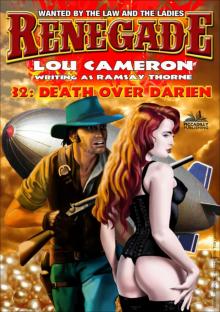 Renegade 32
Renegade 32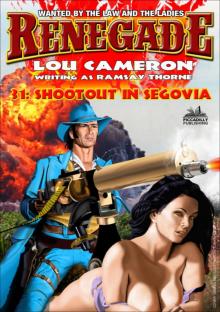 Renegade 31
Renegade 31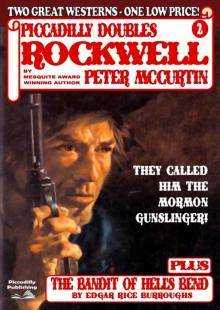 Piccadilly Doubles 2
Piccadilly Doubles 2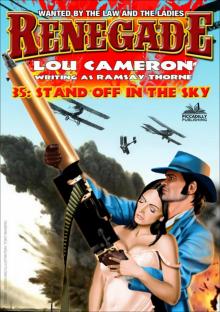 Renegade 35
Renegade 35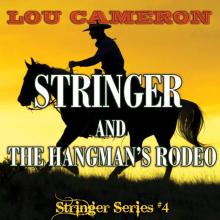 Stringer and the Hangman's Rodeo
Stringer and the Hangman's Rodeo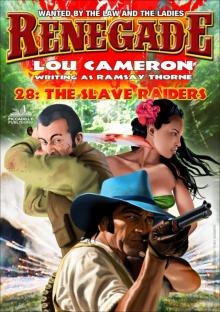 Renegade 28
Renegade 28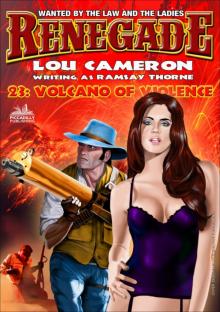 Renegade 23
Renegade 23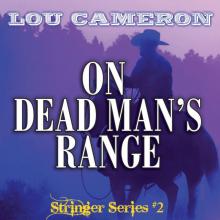 On Dead Man's Range
On Dead Man's Range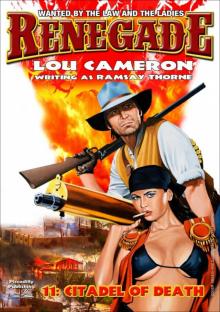 Citadel of Death (A Captain Gringo Western Book 11)
Citadel of Death (A Captain Gringo Western Book 11)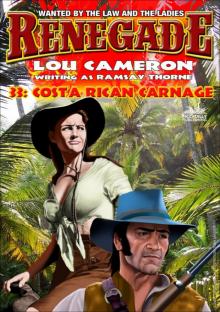 Renegade 33
Renegade 33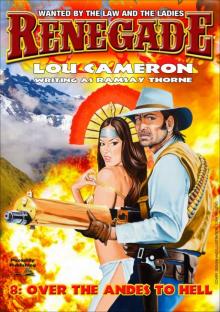 Over the Andes to Hell (A Captain Gringo Western Book 8)
Over the Andes to Hell (A Captain Gringo Western Book 8)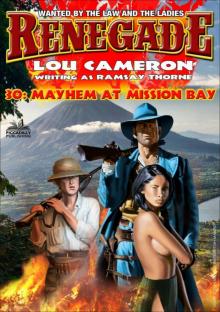 Renegade 30
Renegade 30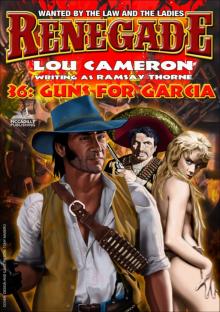 Renegade 36
Renegade 36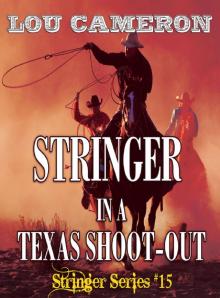 Stringer in a Texas Shoot-Out
Stringer in a Texas Shoot-Out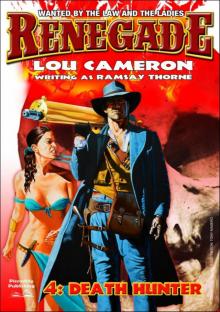 The Death Hunter
The Death Hunter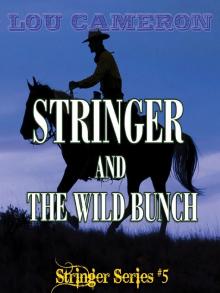 Stringer and the Wild Bunch
Stringer and the Wild Bunch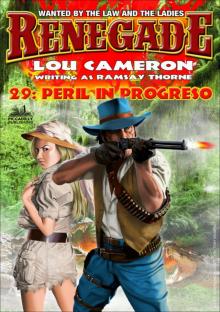 Renegade 29
Renegade 29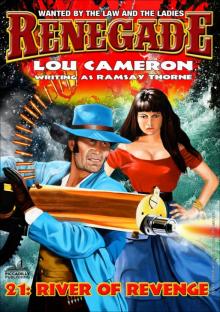 Renegade 21
Renegade 21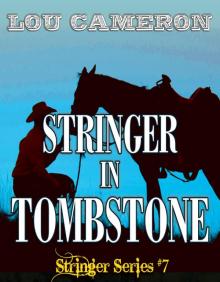 Stringer in Tombstone
Stringer in Tombstone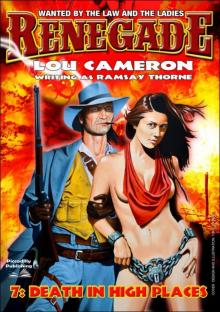 Death in High Places (A Renegade Western Book 7)
Death in High Places (A Renegade Western Book 7)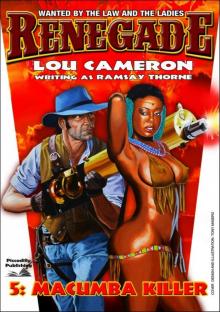 Macumba Killer
Macumba Killer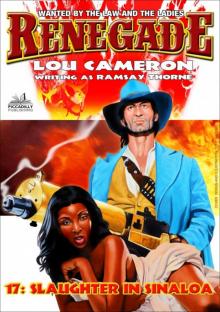 Renegade 17
Renegade 17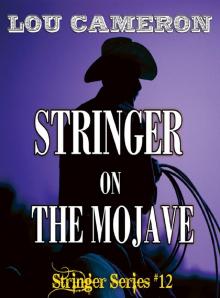 Stringer on the Mojave
Stringer on the Mojave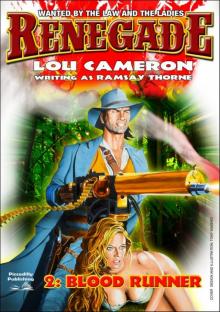 Blood Runner
Blood Runner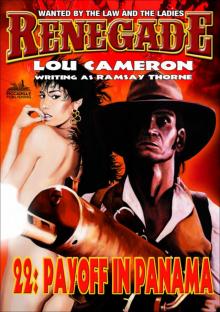 Renegade 22
Renegade 22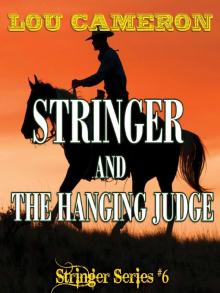 Stringer and the Hanging Judge
Stringer and the Hanging Judge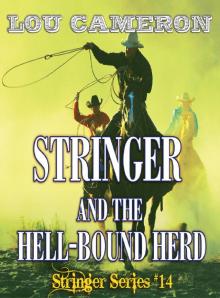 Stringer and the Hell-Bound Herd
Stringer and the Hell-Bound Herd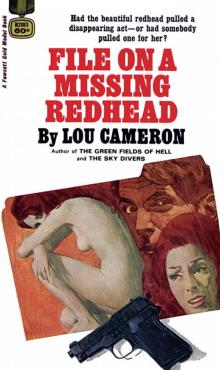 File on a Missing Redhead
File on a Missing Redhead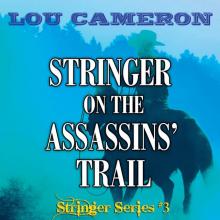 Stringer on the Assassins' Trail
Stringer on the Assassins' Trail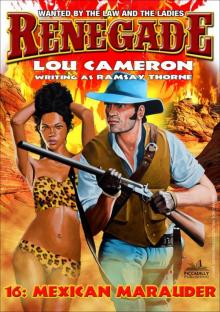 Mexican Marauder (A Captain Gringo Adventure #16)
Mexican Marauder (A Captain Gringo Adventure #16)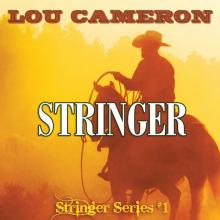 Stringer
Stringer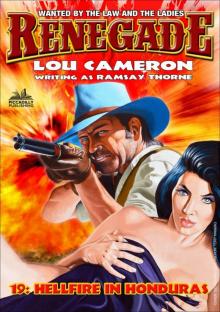 Renegade 19
Renegade 19 Stringer and the Oil Well Indians
Stringer and the Oil Well Indians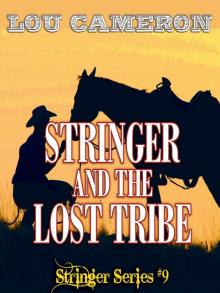 Stringer and the Lost Tribe
Stringer and the Lost Tribe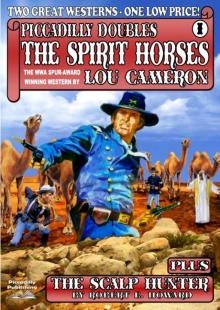 Piccadilly Doubles 1
Piccadilly Doubles 1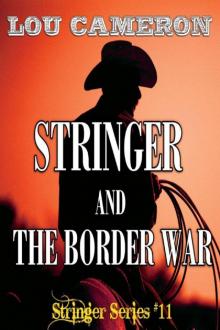 Stringer and the Border War
Stringer and the Border War Renegade
Renegade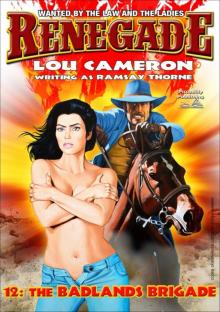 The Badlands Brigade (A Captain Gringo Adventure Book 12)
The Badlands Brigade (A Captain Gringo Adventure Book 12)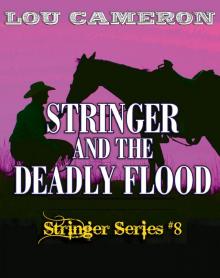 Stringer and the Deadly Flood
Stringer and the Deadly Flood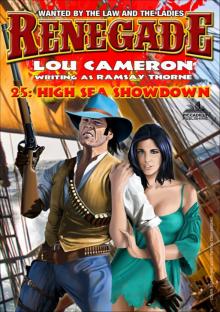 Renegade 25
Renegade 25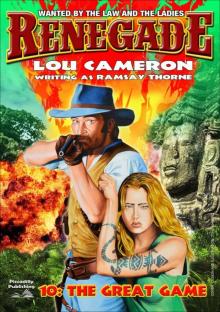 The Great Game (A Captain Gringo Western Book 10)
The Great Game (A Captain Gringo Western Book 10)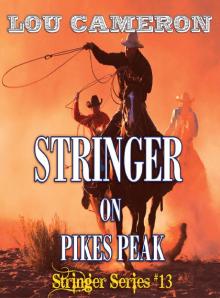 Stringer on Pikes Peak
Stringer on Pikes Peak